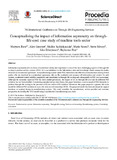JavaScript is disabled for your browser. Some features of this site may not work without it.
| dc.contributor.author | Farsi, Maryam | |
| dc.contributor.author | Grenyer, Alex | |
| dc.contributor.author | Sachidananda, Madhu | |
| dc.contributor.author | Sceral, Mario | |
| dc.contributor.author | Mcvey, Steve | |
| dc.contributor.author | Erkoyuncu, John Ahmet | |
| dc.contributor.author | Roy, Rajkumar | |
| dc.date.accessioned | 2020-01-06T15:25:46Z | |
| dc.date.available | 2020-01-06T15:25:46Z | |
| dc.date.issued | 2019-11-02 | |
| dc.identifier.citation | Farsi M, Grenyer A, Sachidananda M, et al., (2018) Conceptualising the impact of information asymmetry on through-life cost: case study of machine tools sector. Procedia Manufacturing, Volume 16, 2018, pp. 99-106 | en_UK |
| dc.identifier.issn | 2351-9789 | |
| dc.identifier.issn | https://doi.org/10.1016/j.promfg.2018.10.172 | |
| dc.identifier.uri | https://dspace.lib.cranfield.ac.uk/handle/1826/14884 | |
| dc.description.abstract | Information asymmetry (IA) in terms of contextual variety and importance is one of the most challenging aspects of through-life costing in product-service systems (PSS). IA is an imbalance in the information, data and knowledge shared among the parties involved in a contractual agreement. In manufacturing systems under PSS, interaction and effective communication among several parties who are involved in a contractual agreement, rely on the continuity and accuracy of information and context. In such systems, contextual variety exhibits complexity and uncertainty in through-life costing and subsequently in PSS cost assessment. Although the economic aspect of PSS has been studied previously, the impact of IA on through-life cost and for different PSS solutions has not been detailed. Considering manufacturing value chains, this paper introduces a new concept of PSS-hierarchy to perform through-life costing in the presence of IA for various PSS solutions. Moreover, this paper proposes a generic life-cycle model for different PSS solutions to assess the total cost of ownership (TCO). The proposed model has been developed to support decisions on contract design in manufacturing systems. This study considers the manufacturer, service provider and customer perspectives to develop the TCO model using a machine tool manufacturing case study. | en_UK |
| dc.language.iso | en | en_UK |
| dc.publisher | Elsevier | en_UK |
| dc.rights | Attribution-NonCommercial-NoDerivatives 4.0 International | * |
| dc.rights.uri | http://creativecommons.org/licenses/by-nc-nd/4.0/ | * |
| dc.subject | Product-service system | en_UK |
| dc.subject | Information asymmetry | en_UK |
| dc.subject | Through-life costing | en_UK |
| dc.subject | Through-life costing | en_UK |
| dc.subject | Manufacturing systems | en_UK |
| dc.subject | Uncertainty assessment | en_UK |
| dc.title | Conceptualising the impact of information asymmetry on through-life cost: case study of machine tools sector | en_UK |
| dc.type | Article | en_UK |
Files in this item
The following license files are associated with this item:
This item appears in the following Collection(s)
-
Staff publications (SATM) [4367]

